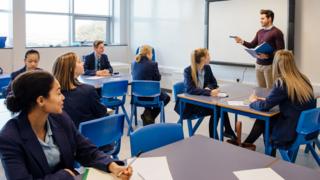 Image copyright
Getty Images
Image copyright
Getty Images
When schools reopen fully in England in September, the government wants teachers to keep classes or whole year groups apart in separate "bubbles".
New guidance has been published for England. There are separate plans for Scotland, Wales and Northern Ireland.
Who will be expected to go back?
Nearly all children of legal school age will be expected to return to class full-time in September to "start to reverse the enormous costs of missed education".
This includes those with special educational needs and disabilities, or who have been shielding during the pandemic.
Do I have to send my child back?
Attendance will be mandatory again from the beginning of the autumn term.
Head teachers will be told to follow up pupils' absence and issue sanctions, including fines in some cases.
But what if there is a Covid-19 cluster at a school?
If a school has a suspected coronavirus outbreak - with two or more confirmed cases within 14 days, or an overall rise in suspected coronavirus sickness absence - teachers will liaise with local health teams.
A mobile testing unit may arrive - focusing first on those in the affected child or teacher's class, followed by their year group, and then the whole school if necessary.
A large number of pupils may be asked to self-isolate at home as a precaution, but the government says a whole school closure "will not generally be necessary" unless advised by health officials.
Image copyright Getty ImagesHow will the school day work?
Schools will be asked to return "to a broad and balanced curriculum," Education Secretary Gavin Williamson told the Commons.
They will be asked to minimise the number of contacts each pupil has during the day, by keeping classes or whole year groups apart in separate "protective bubbles" rather than practising individual social distancing.
Schools must:
have strict hand-washing policies promote the "catch it, bin it, kill it" approach when it comes to coughing and sneezing step up cleaning arrangements be ready to contact NHS Test and TraceThe government expects school kitchens to be open from September.
Image copyright Getty ImagesWhat about getting to and from school?
There may be staggered start and finish times to keep groups apart - although that should not reduce the amount of overall teaching time.
Walking or cycling to school will be encouraged. Parents should not gather in groups at school gates or go on site without an appointment.
Public transport use should be kept to an "absolute minimum", especially at peak times.
Dedicated school transport services will be asked to:
Move children in "bubbles" Provide hand sanitiser Apply social distancing where possible Ask children over 11 to wear face coveringsSchools will also need a process for staff and pupils to remove face coverings safely on arrival at school.
What about breakfast or after-school clubs?
If possible these should resume in September, but the government acknowledges it will be "logistically challenging" and may take longer for some schools.
Children should ideally stay within their year groups or bubbles - but if this can't be done then schools should use "small, consistent groups" to minimise the risk of infection.
What else does the government say?
Pupils should wear uniform as normal Pupils should bring only essentials to school - including lunch boxes, books, stationery and mobile phones Pupils and teachers can take books and other shared resources home, but must avoid unnecessary sharing Non-contact physical education can take place - outside if possible - with "scrupulous attention" to cleaning and hygiene GCSE and A-level students not happy with the calculated grades awarded this summer can resit in the autumn GCSEs and A-levels will take place in summer 2021 but with adaptations to ensure fairness Primary school assessments will happen as normal next summer Ofsted inspections will remain suspended for the autumn term - but schools may be visited to assess how the new arrangements are workingWhich children won't be back in class?
Pupils who are self-isolating will not be required to attend.
This will be because they have had symptoms or a positive test result themselves - or because they are a close contact of someone who has Covid-19.
Children who have been shielding - because they or someone in their household are clinically extremely vulnerable - will be expected to go to school in September.
Shielding advice for adults and children is due to pause in England on 1 August - subject to a continued decline in virus transmission rates.
The government says it expects this will mean "most staff" can go back to school.
If rates of the disease rise in a local area, shielding advice will be introduced once again - but only while local rates remain high.
Children who are not shielding, but who remain under the care of a specialist health professional, should discuss their ongoing care before September.
Schools should offer remote learning to children who are self-isolating or temporarily shielding.
Have you been affected by the school closures due to coronavirus? Please get in touch by emailing haveyoursay@bbc.co.uk.
Please include a contact number if you are willing to speak to a BBC journalist. You can also contact us in the following ways:

 5 years ago
745
5 years ago
745 

